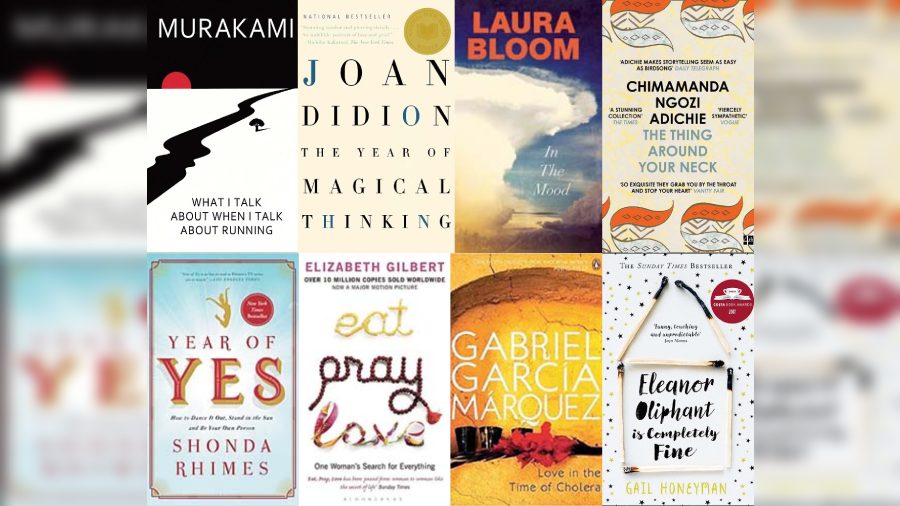A dear friend’s recent moving plans and her subsequent musings suddenly got me thinking. “I don’t know anyone in that city. I could be anybody!” she exclaimed. I found myself falling down the rabbit hole of fresh starts, wondering what it is that makes them, however trivial, so fascinating — is it the thrill of the unknown or the promise of not repeating old mistakes? Every diet plan has to start on a Monday, every new habit picked at the beginning of a week or month, every bad habit to be forsaken on a fresh new day. While the Gregorian calendar witnesses the bulk of these fresh starts, why should the Bengali new year be left behind? Fresh starts can be daunting, healthy, happy or just the acceptance of sadness and it made me think of all the books I have read in the past that channeled this ‘starting-over’ energy.
Since it is the beginning of the year, there are two books that encapsulate a year each in two distinctly different manners. Year of Yes: How to Dance It Out, Stand In the Sun and Be Your Own Person by Shonda Rhimes and The Year of Magical Thinking by Joan Didion are the stories of two powerful women, both struggling — the former with the challenge of saying ‘yes’ to every possibility coming their way and the latter with the inhuman tragedy of the sudden death of a beloved husband. Shonda Rhimes, the television queen of Shondaland fame promises to not say ‘no’ in a single year — to scripts, to new shows, to parties and to everything else that follows before and after it. It is a lesson on the transformative powers of choices when compelled to accept with open embrace. Didion, on the other hand, recounts her journey of finding peace and acceptance of her husband’s untimely death, in evocative prose that is heart-wrenching and educative, imparting lessons on survival.
Coping of course brings us to the Elizabeth Gilbert classic Eat, Pray, Love that had us fawning over Julia Roberts romancing in the arms of Javier Bardem on the beaches of Indonesia. Stricken with heartbreak, her coping comes with dollops of privilege that allows her to escape her reality of a divorce to the gorgeous lands of Italy and Asia. Not all struggles are stricken with grief, and some eventually empower you enough to take a simple step you were too cowardly to take before.
However, one doesn’t need the final outcome of death or divorce to feel the loss of a spouse. Some grow apart because of extenuating circumstances that are beyond human control. In the case of Laura Bloom’s In the Mood, it is war that drives a wedge between war-return Robert and his wife Catherine who he hasn’t met in three years. While he is torn between the promise of a safe life ahead and the traumatic memories of war, she is coping with the memory of her affair with an US marine that she is too scared to reveal to her husband. The year is 1946 but the feelings of loss permeate the sheath of time and reach out to the reader. In the Mood teaches us that starting over is as much about acceptance as it is about letting go.

Loving and letting go brings us to Gabriel Garcia Marquez’s Love in the Time of Cholera where Florentino Ariza teaches us that love is patient and persistent. Falling in love with Fermina who later marries a rich doctor, Florentino wades through many affairs before showing up at Fermina’s husband’s funeral, to declare his love five decades later. Some fresh starts, Antonio teaches us, begin by staying put at the start line, waiting for the whistle to blow.
Chimamanda Ngozi Adichie’s The Thing Around Your Neck comes to mind for weaving together the most interesting and depth-filled short stories that are equal parts hopeful and tragic. She writes about Nigeria which is strife-torn but bustling with the celebratory energy of open marketplaces, of wrongfully convicted men rescued from jail through bribery, of women taking asylum in the United States and reconciling their idea of a new home. They open your eyes to an experience which may be unique but come loaded with emotions that are universal.
Very few popular books manage to encapsulate this universality than Eleanor Oliphant is Completely Fine by Gail Honeyman. Eleanor is a woman who speaks exactly as she thinks and spends her weekends drowning in pizza, vodka and phone calls with her mother. Her lonely life only has discipline and routine for company till one day, she falls in love with a musician. Her friendship with unhygienic IT guy Raymond flourishes over coincidence and a shared encounter. The book is heart-wrenching in its openness with an ending that leaves you measuring the depth of human frailties with an unending measuring tape. The ending of the book may not be one we want but it definitely is one that we need.
Speaking of books we need, Haruki Murakami’s What I Talk About When I Talk About Running is a searing document of the reclusive author’s time after having sold his jazz bar to become a full-time writer. He takes up long-distance running as a method of keeping fit, eventually going on to run triathlons and marathons. This book is his account of that journey and the many lessons, memories and epiphanies that he was led to, through this activity. For those looking for a fresh start, there couldn’t perhaps be one better than this book.
My friend just messaged me to ask if living alone for the first time ever made me cry. The confidence of being ‘anybody she wanted’ is slowly being replaced by the shaken worries of a late bloomer in the face of change. I can’t tell her that I haven’t cried on such lonely nights when I lived alone for the first time at 21, because I’d be lying. However, I do plan to give her a copy of one of these books to keep her company on those particular nights.
